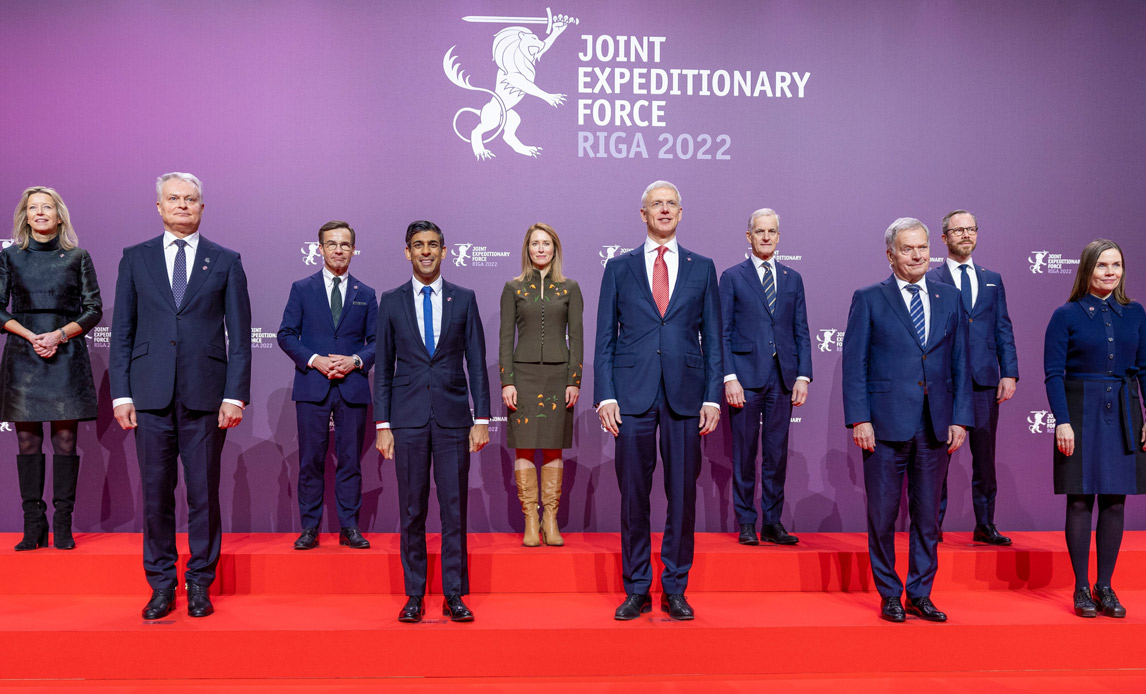News
The JEF-countries confirm their support for Ukraine’s fight against Russia
The Minister of Defence Jakob Ellemann-Jensen attended his first meeting in the Regional defence corporation, Joint Expeditionary Force (JEF). During the meeting, the countries confirmed their support for Ukraine’s fight against Russia and an ambition to strengthen the defence corporation in the years to come.

Jef ministers.
Hybrid threats, increasing tensions in Europe and Russia’s aggressive conduct were on the program when the leaders from the defence corporation, JEF, met in Riga, Latvia.
“Russia’s attack on Ukraine has endlessly changed Europe and significantly changed the threats we are facing. Therefore, it excites me that the leaders from the JEF-countries today confirmed our support for Ukraine’s fight against Russia as long as it is needed. Ukraine’s fight for freedom is ours and Europe’s fight for freedom,” says Minister of Defence Jakob Ellemann-Jensen.
The Ukrainian president, Volodymyr Zelenskyy, participated in today’s meeting via video link. Besides confirming the support for the Ukrainians battle, the JEF-countries agreed to increase the support to accommodate hybrid threats against things such as energy infrastructure.
The Minister of Defence, Jakob Ellemann-Jensen states:
“It is good to get started, and the collaboration with the other JEF-countries is an important part of Denmark’s contribution to the NATO cooperation. The tensions in Denmark’s nearby areas are increased and the threats have changed character, which result in new demands for the Danish military. That is why it is essential to stand together with our allies during the fight for our values, which we have fought for in generations,” says Jakob Ellemann-Jensen.
Read the joint statement from JEF-countries here:
JEF LEADERS’: LANGUAGE FOR STATEMENT
We, the Leaders of the United Kingdom, Denmark, Estonia, Finland, Iceland, Latvia, Lithuania, the Netherlands, Norway and Sweden met today as members of the Joint Expeditionary Force (JEF), a framework of nations established under NATO auspices in 2014. We considered a range of security challenges affecting our region, including increased Russian military activity in the High North, North Atlantic and Baltic Sea region, and growing hybrid threats. We reaffirmed the role of the JEF, working in full complementarity with NATO, in addressing these tensions and upholding defence, security and stability in northern Europe.
We heard first hand from President Zelenskyy of Ukraine’s continued determination and resolve in the face of Russia’s unprovoked and illegal war. We remain steadfast in our support for Ukraine and its people. Today we committed to provide further political, military, humanitarian and economic support to Ukraine for as long as it takes. Ukraine’s victory is vital to all our security. We condemn Russia’s attacks on critical national infrastructure designed to terrorise Ukraine’s people. Intentional attacks against the civilian population and civilian objects constitute war crimes. We reiterate our determination to ensure full accountability for these abhorrent actions, as well as accountability for crimes committed against Ukraine. We will continue supporting Ukrainian citizens who have had to flee their homes. We reject Russia’s ongoing violation of Ukraine's sovereignty, independence and territorial integrity, and its illegal attempts to annex Ukrainian territory. We continue to recognise Ukraine’s internationally recognised borders, and the fundamental principle, enshrined in the UN Charter, that these cannot be redrawn by force.
We welcome President Zelenskyy’s readiness for a just peace. No peace talks can be credible while Russia continues to pursue a war of aggression. We therefore call on Russia to cease hostilities, withdraw its forces, abide by its commitments under international law, and restore peace and security in Europe. We also reaffirm our readiness to further strengthen political and practical cooperation with Ukraine.
This year we strengthened our ability to operate together in a crisis, increasing our exercises in response to the challenges confronting us. Today we agreed to accelerate cooperation in tackling hybrid threats, with a focus on deterring and defending against threats to our shared subsea data and energy infrastructure. This will include enhanced intelligence sharing, working with industry and multinational partners to boost resilience and improve our ability to respond collectively. In addition, we will continue to provide practical support to Finland and Sweden ahead of their accession to NATO, including through visible military presence in the region. Their accession will make our Alliance stronger and more secure, fortifying northern Europe and the Baltic’s defences in the face of complex threats. In the High North, we will pursue strong cooperation with Allies, acting together to address the challenges we see across the region. The JEF’s signature exercise for 2023 - Exercise JEF Warrior - will take place in the High North, demonstrating our ability to operate in that harsh environment at sea, on land and in the air, while we will continue to exercise in the North Atlantic and Baltic Sea region.
We also discussed the evolving role of the JEF as a complement to NATO. Now is the moment to ensure the JEF has the capability to contribute to the defence and security of our region, ensuring it can act swiftly to tackle the threats we face. We will do this together with NATO, ensuring the JEF bolsters both national and multinational responses. We agreed to commission work on a ten year vision for the JEF before we meet again in 2023.